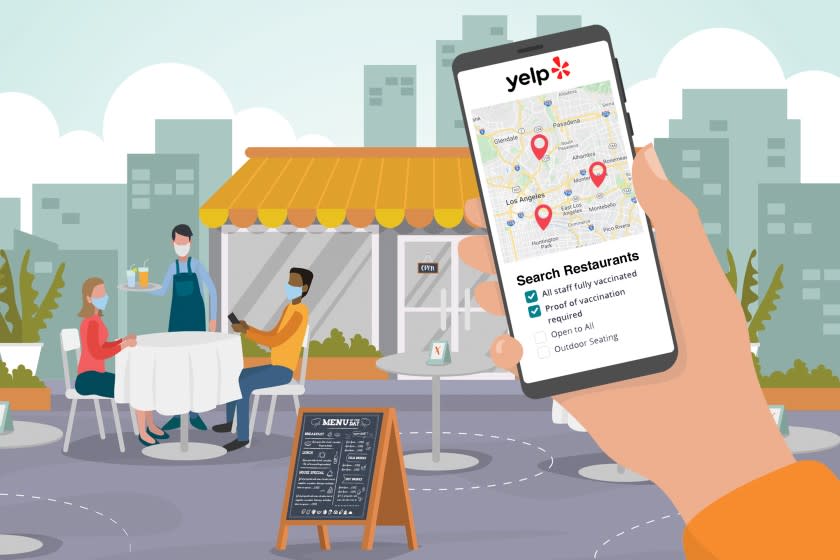Restaurant tech companies want to make it easier to check vaccine requirements

Before you scroll down to check a restaurant’s online reviews or find out whether your favorite spot has a table available on Friday night, you might see even more pertinent information for dining out in 2021: whether you’ll be required to show proof of vaccination.
After citywide vaccination mandates for indoor dining in New York City, San Francisco and New Orleans — and with many other restaurateurs, chefs and bartenders independently implementing their own vaccination requirements — some online reservation systems and apps are trying to make these new restrictions clear to the public.
In early August, Yelp added two new information lines to its listings: “proof of vaccination required” and “all staff fully vaccinated,” which restaurant, bar and other venue owners can update themselves. Now users can not only see that information, but they can also search by it, filtering results by vaccination requirements for guests and/or staff.
Online reservation system OpenTable has rolled out some new features as well. “If you’re in the restaurant tech space, you’re trying to figure out — just like we are — how best to help our restaurant partners,” said OpenTable Chief Executive Debby Soo. “It’s been a grueling year and a half for the restaurant industry, so any provider or partner or platform worth its weight is going to be looking to make the lives of our restaurateurs easier.”
In mid-August, OpenTable announced a feature similar to Yelp’s, displaying restaurants’ vaccination requirements in addition to already-listed safety precautions, such as required temperature checks for guests, spacing between tables, contactless payment and disposable menus. It also initiated direct messaging between restaurants and diners to communicate about new rules and regulations. A new online map pinpoints restaurants requiring vaccination for indoor dining.
Days later, OpenTable went a step further, implementing a tool that would allow restaurants to note guests’ vaccination statuses once they have been cleared to enter the eatery. The system now lets staff tag diners as “verified for entry” once proof of vaccination has been checked on-site and stores that status — but not the actual proof of vaccination — so that restaurants won’t need to request a card or digital image when a repeat diner books a future reservation. (This feature is limited to noting the vaccination status of only the diner who made the reservation, not the entire party.)
Last week, OpenTable announced a partnership that will store a virtual vaccine card, should diners wish to create an account with Clear, a mobile app designed to store travel-pertinent user data. Developed to help users expedite Transportation Security Administration screenings and other travel checkpoints, it’s since become one of a handful of apps storing vaccination records digitally. Clear’s Health Pass feature — where the digital vaccine card is stored — is free, and, starting in September, is set to link to OpenTable via a banner at the top of an OpenTable web page once users book a reservation at a restaurant requiring proof. Soo recently tested her virtual card at a restaurant in San Francisco and said the check-in time took less than 10 seconds.
While adding vaccination requirements to a restaurant’s listing or reservation page might streamline the process for diners hoping to seek out these restaurants, it can paint a target on a business for those who disagree with various mandates.
“For businesses that activate ‘Proof of vaccination required’ and ‘All staff fully vaccinated’ on their Yelp page, we are putting protective measures in place to proactively safeguard them from reviews that primarily criticize the COVID health and safety measures they enforce,” Yelp announced at the beginning of August.
It’s called “review bombing”: When a controversial or otherwise newsworthy business finds itself at the center of a discourse — be it requiring proof of vaccination or simply being a minority- or LGBTQ-owned establishment — negative user reviews based not on firsthand experience, but bias or hatred, can overwhelm a restaurant or bar’s page and skew the star rating.
Yelp reports that “review bombing” has increased since the beginnings of the pandemic and that in 2021, as of Aug. 5, the company has removed roughly 8,000 reviews that exist not to critique a business but its vaccination requirements or lack thereof.
At OpenTable, the feedback has been mixed.
From the restaurateur side, the reaction has been primarily positive, Soo said. On the diner side, some users are conflating the initiative launches with a pro-vaccine-mandate stance from the company.
“At the end of the day, our restaurateurs are not TSA Pre-Check agents,” Soo said. “They specialize in providing amazing hospitality, so this is like a new world for everyone... it’s not for us to say if we’re for, or pro, or against this or not. We’re just trying to be a helpful tool that restaurants and diners can use.”
Whatever users and restaurateurs think about vaccination requirements, some new features are here to stay. Direct messaging at OpenTable will most likely become permanent, and in a post-COVID world, the “verified for entry” program could transition from noting vaccination to whether a guest is over 21 or holds a certain VIP status — more proof that the pandemic will affect the restaurant-tech landscape for years to come.
This story originally appeared in Los Angeles Times.
